The de-oiled lecithin market is projected to grow from USD 259.3 million in 2025 to USD 534.4 million by 2035, reflecting an absolute dollar opportunity of USD 275.1 million over the forecast period. Between 2025 and 2029, the market is expected to increase from USD 259.3 million to USD 322.6 million, driven by heightened use in bakery, confectionery, and convenience foods where lecithin acts as an emulsifier and stabilizer. From 2030 to 2032, the market is projected to advance to USD 430.1 million, supported by wider utilization in nutraceuticals, pharmaceuticals, and animal feed applications. By the end of 2035, the market will reach USD 534.4 million, fueled by rising demand for clean-label and non-GMO formulations, expansion into personal care products, and increasing adoption of powder-based formats.
The next phase, 2030 to 2035, witnesses expansion from USD 278.7 million to USD 400.1 million, reflecting wider utilization in feed formulations and personal care applications where lecithin enhances bioavailability and texture. Advancements in extraction technologies, improved degumming methods, and cost-efficient production processes further catalyze this growth.
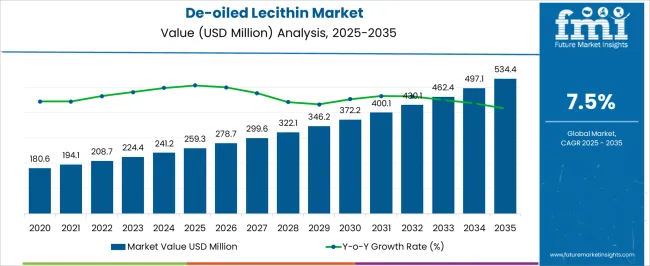
| Metric | Value |
|---|---|
| De-oiled Lecithin Market Estimated Value in (2025 E) | USD 259.3 million |
| De-oiled Lecithin Market Forecast Value in (2035 F) | USD 534.4 million |
| Forecast CAGR (2025 to 2035) | 7.5% |
The de-oiled lecithin market is experiencing notable growth driven by increasing demand from the food and beverage industry as well as other industrial sectors. The rising preference for natural and clean-label ingredients has positioned soy-based lecithin as a popular emulsifier and stabilizer.
Advancements in extraction and processing techniques have improved the purity and functionality of de-oiled lecithin, making it suitable for a wider range of applications. Growing consumer awareness of health and nutrition is encouraging manufacturers to incorporate lecithin as a natural additive that supports texture, shelf life, and nutritional value.
Expanding usage in bakery, confectionery, dairy, and beverage products is fueling overall market growth. Furthermore, the shift towards powder formulations has been influenced by their convenience in handling, longer shelf life, and ease of blending. With increasing demand from food processors and expanding application areas, the market is expected to continue its upward trajectory. Segmental growth is anticipated to be led by soy-based lecithin, powder form, and the food and beverage application sector.
The de-oiled lecithin market is segmented by source, form, application, and region. By source, it is divided into soy-based, sunflower-based, rapeseed-based, and others. By form, it is classified into powder, granules, and liquid. Based on application, the market is segmented into food and beverage, pharmaceuticals, cosmetics, feed, industrial, and others. Regionally, the de-oiled lecithin industry is categorized into North America, Latin America, Western Europe, Eastern Europe, Balkan & Baltic countries, Russia & Belarus, Central Asia, East Asia, South Asia & Pacific, and the Middle East & Africa.
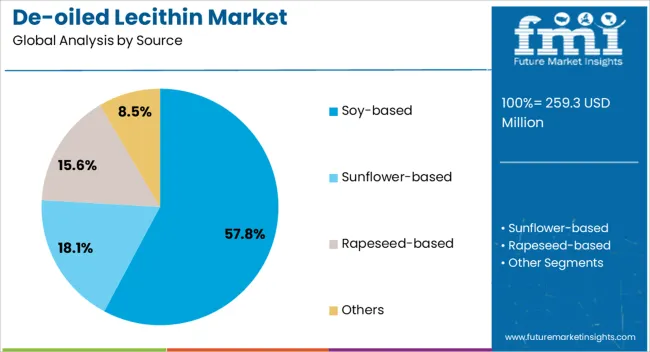
The Soy-based segment is projected to hold 57.8% of the de-oiled lecithin market revenue in 2025, retaining its position as the leading source. This segment’s growth is attributed to the widespread availability of soybeans and the efficient extraction processes developed over years of agricultural innovation.
Soy-based lecithin is favored for its cost-effectiveness and versatility in food and industrial applications. It has been widely adopted for its emulsifying properties that improve product texture and consistency.
The segment also benefits from continuous advancements in non-GMO and organic soy cultivation, catering to consumer demands for natural ingredients. Regulatory approvals and international trade agreements have further facilitated the distribution and use of soy-based lecithin. As the preference for plant-derived ingredients strengthens, the Soy-based segment is expected to maintain its dominance.
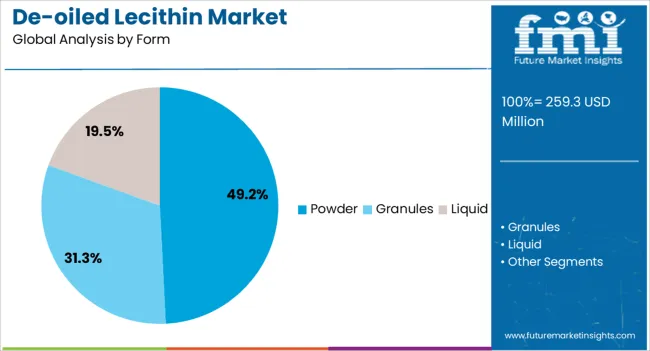
The Powder form segment is expected to contribute 49.2% of the market revenue in 2025, establishing itself as the preferred product format. The powder form of de-oiled lecithin offers practical advantages such as improved solubility, ease of storage, and extended shelf life.
Food processors and manufacturers favor powder lecithin because it integrates smoothly into dry mixes and liquid formulations. Moreover, powder lecithin facilitates precise dosing and handling, enhancing production efficiency.
These attributes have made powder lecithin popular in bakery, confectionery, and beverage industries. Continuous product innovations aimed at improving powder flowability and stability have further supported segment growth. As the demand for convenient and stable lecithin products increases, the powder segment is anticipated to sustain its leading market share.
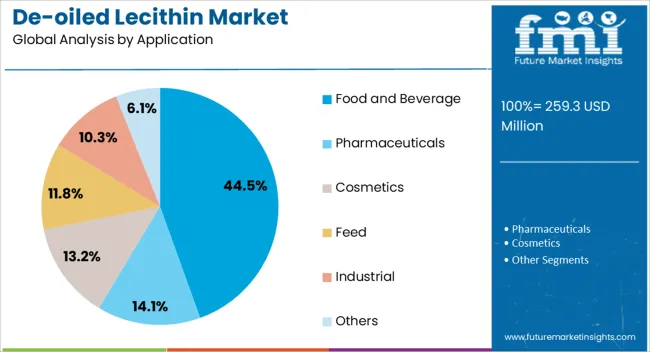
The Food and Beverage segment is projected to hold 44.5% of the de-oiled lecithin market revenue in 2025, maintaining its position as the dominant application sector. This growth is driven by lecithin’s multifunctional role as an emulsifier, stabilizer, and antioxidant in a wide range of food products.
Increasing consumer demand for clean-label and plant-based ingredients has encouraged manufacturers to incorporate lecithin into baked goods, dairy alternatives, confectionery, and beverages. The segment has benefited from ongoing research into enhancing lecithin’s functional properties to meet specific application needs such as improving dough conditioning and shelf stability.
Additionally, food safety regulations and quality standards have promoted the use of natural additives like lecithin to replace synthetic counterparts. With the global rise in processed food consumption and health-conscious product innovation, the Food and Beverage segment is expected to continue leading the market.
De-oiled lecithin is expanding across food, feed, pharma, and personal care industries. Its versatility as an emulsifier, stabilizer, and bio-functional additive continues to reinforce its global demand profile.
De-oiled lecithin is gaining wider traction in food and beverage formulations, largely due to its functionality as an emulsifier and stabilizer. It enhances the quality of bakery goods, chocolates, and dairy products by improving texture and extending shelf life. The growing demand for allergen-free and clean-label ingredients has pushed food processors to integrate de-oiled lecithin more prominently into their product lines. Its non-GMO and plant-derived nature has also strengthened acceptance across premium product categories. Companies are actively reformulating recipes to replace synthetic emulsifiers with de-oiled lecithin, boosting its market share. These trends emphasize the ingredient’s importance in shaping food product development.
The animal feed sector has emerged as a major consumer of de-oiled lecithin, especially in poultry, aquaculture, and swine diets. Its nutritional benefits include enhancing fat metabolism, improving digestibility, and supporting growth performance. Feed manufacturers are increasingly using de-oiled lecithin as a cost-effective additive to enhance feed conversion ratios and optimize nutrient absorption. Rising protein demand across global markets has led to greater emphasis on efficient feed formulations, where de-oiled lecithin contributes significantly. Its ability to improve energy utilization and support immune function makes it a preferred choice in livestock nutrition strategies. This growing integration underlines its critical role in feed applications.
Pharmaceutical and nutraceutical companies are adopting de-oiled lecithin for its purity, stability, and compatibility with active ingredients. It is being increasingly used in capsule formulations, liposomal drug delivery systems, and dietary supplements. Demand is being reinforced by the rising popularity of nutraceuticals and functional foods, where de-oiled lecithin provides effective delivery mechanisms for bioactive compounds. Its multifunctional role as both an excipient and a stabilizer is expanding adoption in high-value applications. Pharmaceutical firms are focusing on its performance in controlled-release and targeted delivery solutions. These attributes highlight the potential of de-oiled lecithin to expand further in healthcare-oriented formulations.
The cosmetics and personal care segment is gradually embracing de-oiled lecithin as a natural alternative in emulsification and stabilization processes. It is increasingly used in creams, serums, lotions, and hair care products for its skin-friendly properties and compatibility with other natural actives. Manufacturers are incorporating it to meet rising consumer demand for plant-based and clean-label ingredients in beauty products. Its ability to enhance hydration, improve product consistency, and extend shelf life makes it a valuable addition to personal care formulations. The ongoing focus on naturally derived formulations and consumer preference for chemical-free options is set to reinforce adoption in this segment.
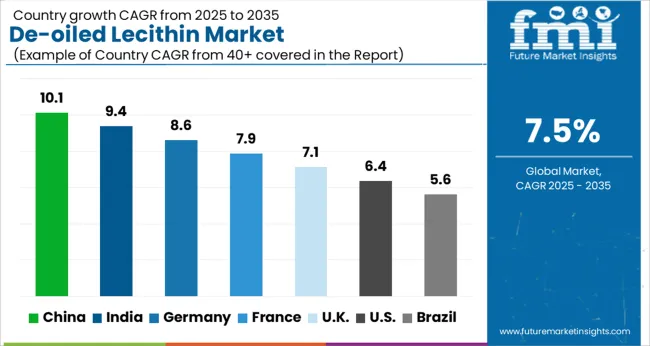
The de-oiled lecithin market is projected to expand globally at a CAGR of 7.5% from 2025 to 2035, supported by its applications in food, feed, pharmaceuticals, and personal care. China leads with a CAGR of 10.1%, driven by extensive use in bakery, confectionery, and expanding nutraceutical applications alongside a strong feed industry base. India follows at 9.4%, benefiting from large-scale demand in packaged foods, rising dairy and poultry feed requirements, and increasing adoption in dietary supplements. France records 7.9%, influenced by higher integration into confectionery, infant nutrition, and pharmaceutical excipients. The United Kingdom at 7.1% emphasizes compliance-driven food and feed applications, while the United States at 6.4% reflects mature but steady demand in processed foods, healthcare, and personal care formulations. These performance levels highlight Asia-Pacific as the dominant growth hub, while Europe and North America remain critical for specialty-grade, compliance-focused applications of de-oiled lecithin across diverse industrial sectors.
China is projected to post a CAGR of 10.1% for 2025–2035, up from an estimated 8.7% during 2020–2024, placing it well above the global 7.5% path. This stronger pace is driven by widespread adoption of de-oiled lecithin in bakery, confectionery, and dairy formulations, alongside heavy integration into poultry and aquaculture feed. Expansion in nutraceuticals and functional foods has reinforced its role as a versatile additive. China’s capacity scale and raw material availability provide steady supply security, while local investments in refining technologies improve product purity. In my view, China remains the most competitive hub due to the balance of low-cost feedstock and broad market diversification.
India is expected to achieve a CAGR of 9.4% for 2025–2035, compared with about 8.1% in 2020–2024, keeping it above the global 7.5% benchmark. This acceleration is supported by packaged food expansion, wider use in bakery and confectionery, and stronger incorporation into livestock feed. Domestic production advantages and non-GMO sourcing have improved cost competitiveness, while pharmaceutical and nutraceutical adoption is growing rapidly. Expansion of contract manufacturing facilities also supports demand by providing reliable ingredient integration across multiple sectors. I believe India’s mix of agricultural base, cost efficiency, and evolving food industry creates strong growth potential in both domestic and export markets.
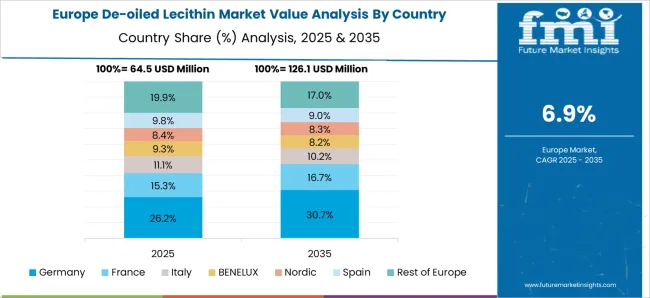
France is projected to register a CAGR of 7.9% during 2025–2035, up from roughly 6.8% achieved in 2020–2024, slightly above the global 7.5% rate. This growth is fueled by adoption in confectionery, infant nutrition, and pharmaceutical applications. The country’s strong emphasis on clean-label formulations has amplified the demand for non-GMO lecithin, especially in premium food products. Pharmaceutical companies are integrating de-oiled lecithin in drug delivery systems, while infant formula manufacturers rely on its stability and safety credentials. In my assessment, France will sustain steady growth by leveraging its premium positioning and regulatory-driven demand across specialty food and healthcare.
The United Kingdom is projected to deliver a CAGR of 7.1% during 2025–2035, compared with about 6.0% in 2020–2024, moving closer to the global 7.5% level. This step-up reflects rising consumer focus on natural emulsifiers in bakery and dairy products, as well as greater demand from pharmaceutical excipients. Growth is further supported by compliance-driven applications in food and feed, where traceability and labeling requirements favor de-oiled lecithin. The UK’s supply chains are adapting to more plant-based and allergen-free preferences, pushing broader use across industries. In my view, while not the fastest, the UK shows steady improvement with balanced adoption in both food and healthcare.
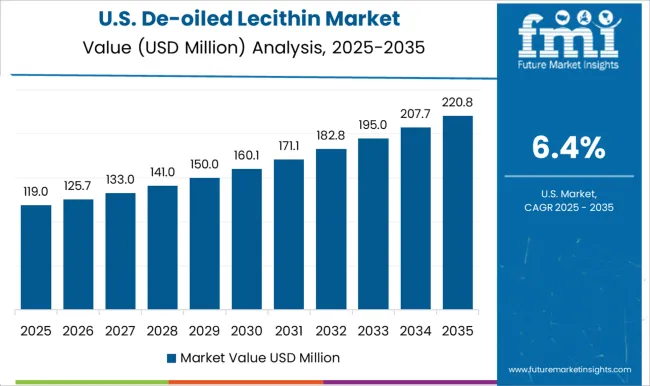
The United States is expected to grow at a CAGR of 6.4% for 2025–2035, up from nearly 5.5% in 2020–2024, slightly below the global 7.5% rate. Growth is supported by increased application in processed foods, dietary supplements, and personal care. Compliance frameworks in pharmaceuticals have strengthened adoption of de-oiled lecithin as an excipient in capsules and liposomal formulations. Demand in the US is also shaped by consumer preference for allergen-free and clean-label food products. While mature compared to Asia, the US market continues to build relevance in niche areas. In my opinion, steady growth will persist, but specialization rather than scale will define the US trajectory.
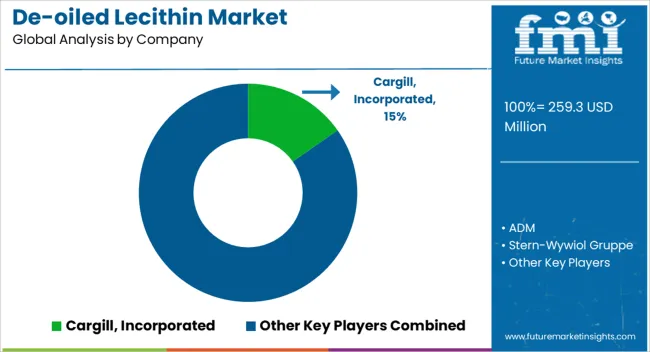
The de-oiled lecithin market features a diverse mix of global agribusiness corporations, specialty ingredient companies, and regional suppliers catering to food, feed, pharmaceutical, and personal care applications. Key participants include Cargill, Incorporated, ADM, Bunge Limited, and DowDuPont Inc., each leveraging extensive processing infrastructure, strong raw material access, and global distribution networks to maintain leadership.
Stern-Wywiol Gruppe, IMCD Group B.V., and Clarkson Specialty Lecithins focus on specialty formulations and distribution, serving premium food and nutraceutical applications with customized lecithin blends. Sonic Biochem, American Lecithin Company, Lecico GmbH, and Lecital emphasize mid-scale supply with strong presence in emulsifiers for bakery, confectionery, and dairy.
Lipoid GmbH and VAV Life Sciences Pvt. Ltd. concentrate on pharmaceutical-grade lecithins, particularly excipients for drug delivery and liposomal formulations. Regional specialists such as Amitex Agro Product Pvt. Ltd. and Austrade Inc. contribute to local supply chains, ensuring cost competitiveness and market access in emerging economies. Competition is shaped by factors including product purity, allergen-free certifications, non-GMO sourcing, and application-specific performance.
Leading companies prioritize R&D in refining technologies, expanding production capacity, and forming collaborations with food and pharma brands. Strategic objectives emphasize supply chain reliability, compliance with regulatory standards, and development of clean-label, high-performance lecithin solutions to capture expanding demand across industries..
| Item | Value |
|---|---|
| Quantitative Units | USD Million |
| Source | Soy-based, Sunflower-based, Rapeseed-based, and Others |
| Form | Powder, Granules, and Liquid |
| Application | Food and Beverage, Pharmaceuticals, Cosmetics, Feed, Industrial, and Others |
| Regions Covered | North America, Europe, Asia-Pacific, Latin America, Middle East & Africa |
| Country Covered | United States, Canada, Germany, France, United Kingdom, China, Japan, India, Brazil, South Africa |
| Key Companies Profiled | Cargill, Incorporated, ADM, Stern-Wywiol Gruppe, IMCD Group B.V., Bunge Limited, Sonic Biochem, American Lecithin Company, Lecico GmBH, Lecital, Austrade Inc., Lipoid GmbH, Clarkson Specialty Lecithins, Amitex Agro Product Pvt. Ltd., VAV Life Sciences Pvt. Ltd., and DowDupont Inc. |
| Additional Attributes | Dollar sales, share, regional consumption trends, demand from food, feed, and pharma, competitor strategies, raw material sourcing, regulatory updates, and growth opportunities across applications. |
The global de-oiled lecithin market is estimated to be valued at USD 259.3 million in 2025.
The market size for the de-oiled lecithin market is projected to reach USD 534.4 million by 2035.
The de-oiled lecithin market is expected to grow at a 7.5% CAGR between 2025 and 2035.
The key product types in de-oiled lecithin market are soy-based, sunflower-based, rapeseed-based and others.
In terms of form, powder segment to command 49.2% share in the de-oiled lecithin market in 2025.






Our Research Products

The "Full Research Suite" delivers actionable market intel, deep dives on markets or technologies, so clients act faster, cut risk, and unlock growth.

The Leaderboard benchmarks and ranks top vendors, classifying them as Established Leaders, Leading Challengers, or Disruptors & Challengers.

Locates where complements amplify value and substitutes erode it, forecasting net impact by horizon

We deliver granular, decision-grade intel: market sizing, 5-year forecasts, pricing, adoption, usage, revenue, and operational KPIs—plus competitor tracking, regulation, and value chains—across 60 countries broadly.

Spot the shifts before they hit your P&L. We track inflection points, adoption curves, pricing moves, and ecosystem plays to show where demand is heading, why it is changing, and what to do next across high-growth markets and disruptive tech

Real-time reads of user behavior. We track shifting priorities, perceptions of today’s and next-gen services, and provider experience, then pace how fast tech moves from trial to adoption, blending buyer, consumer, and channel inputs with social signals (#WhySwitch, #UX).

Partner with our analyst team to build a custom report designed around your business priorities. From analysing market trends to assessing competitors or crafting bespoke datasets, we tailor insights to your needs.
Supplier Intelligence
Discovery & Profiling
Capacity & Footprint
Performance & Risk
Compliance & Governance
Commercial Readiness
Who Supplies Whom
Scorecards & Shortlists
Playbooks & Docs
Category Intelligence
Definition & Scope
Demand & Use Cases
Cost Drivers
Market Structure
Supply Chain Map
Trade & Policy
Operating Norms
Deliverables
Buyer Intelligence
Account Basics
Spend & Scope
Procurement Model
Vendor Requirements
Terms & Policies
Entry Strategy
Pain Points & Triggers
Outputs
Pricing Analysis
Benchmarks
Trends
Should-Cost
Indexation
Landed Cost
Commercial Terms
Deliverables
Brand Analysis
Positioning & Value Prop
Share & Presence
Customer Evidence
Go-to-Market
Digital & Reputation
Compliance & Trust
KPIs & Gaps
Outputs
Full Research Suite comprises of:
Market outlook & trends analysis
Interviews & case studies
Strategic recommendations
Vendor profiles & capabilities analysis
5-year forecasts
8 regions and 60+ country-level data splits
Market segment data splits
12 months of continuous data updates
DELIVERED AS:
PDF EXCEL ONLINE
Lecithin and Phospholipids Market Analysis by Product Type, Form, Nature, Function and Application Through 2035
Lecithin Market Trends – Emulsifiers & Functional Food Ingredients 2025 to 2035
Soy Lecithin Market Size and Share Forecast Outlook 2025 to 2035
Canola Lecithin Market Analysis by Form, Available Grades, Functionality, End Use, and Region through 2025 to 2035
Modified lecithin Market
Fractionated Lecithin Market Growth - Source & Industry Trends
Demand for Canola Lecithin in Japan Size and Share Forecast Outlook 2025 to 2035
Demand for Canola Lecithin in USA Size and Share Forecast Outlook 2025 to 2035

Thank you!
You will receive an email from our Business Development Manager. Please be sure to check your SPAM/JUNK folder too.
Chat With
MaRIA